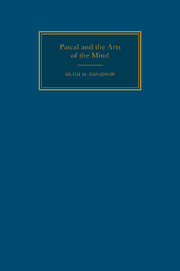3 - Multiplicity, unity, and dialectic
Published online by Cambridge University Press: 26 January 2010
Summary
INTERPRETATION
A CHANGE OF DIRECTION
The preceding analyses grew out of the fact that Pascal is wonderfully competent and innovative when he works in the geometrical mode and according to the intellectual habits rooted in that mode. He grasps the implications of that way of thinking for the mental activities essential to his inquiries: recovery, discovery, ordering, and systematization, each of which takes on its particular identity and coloration in the light of the mode chosen as dominant. Conceived and applied in the geometrical perspective – which includes modifications that adjust it to the requirements of experimental projects – the basic activities are expressed, as is appropriate, in univocal language and in demonstrative discourse.
Of course, that is not the only mode in which Pascal excels. He is adept in at least two other major arts of the mind, (1) dialectic and (2) rhetoric. To look forward for a moment: with a grasp of the way in which Pascalian dialectic proceeds – it does not develop independently but presupposes geometric and sometimes builds on it, usually by contrast – and after studying the principal aspects of Pascal's rhetoric, we shall eventually be able to draw these different orientations into a single and cumulative picture. Our present purpose, however, is to understand and reflect on the first of the remaining pair of disciplines. The sense of the contrast between the preceding esprit de géométrie and the dialectical habit of mind will become clearer as we proceed.
- Type
- Chapter
- Information
- Pascal and the Arts of the Mind , pp. 105 - 209Publisher: Cambridge University PressPrint publication year: 1993

